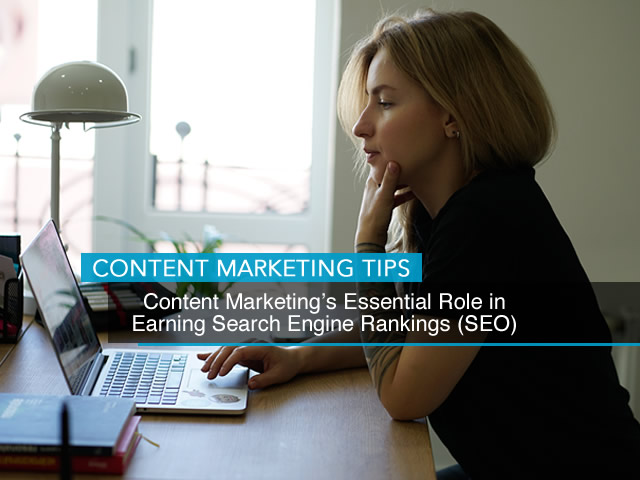
According to a study by MOZ in July 2014, 31.24% of Google's click-through traffic goes to the #1 ranked page in the search results. #2 gets 14.04%, #3 9.85%, #4 6.97% and #5 receives 5.5%. A quick tally reveals that 67.6% of the traffic goes to the top 5 ranked pages. Rankings 6 through 10 only enjoy a paltry 3.73%.
And only 3.99% of Google click-through traffic goes to web pages listed on the 2nd page of Google search results. It’s been said that the best place to hide a dead body is on the second page of Google’s search results. Nobody ever looks there.
If you want to be found online, you still want to be in the top 5 search engine results on Google, Bing and Yahoo! As Ricky Bobby said, in Talladega Nights, "if you're not first, you're last." 🙂 You're either in the top 5, or you're pretty much invisible.
A few years back, you could hire an SEO (search engine optimization professional) to build a bunch of links for you, add some meta tagging, throw in a few keywords and secure top rankings without creating any quality content.
Google has a mission: to serve up the most relevant content possible for a user’s search term. Sending searchers to low quality or nonexistent content, just because the website owners were able to purchase or trade links, or stuff pages with keywords, failed search engine users. It was a serious problem, and Google fixed that issue with Panda and Penguin.
Google still values organic links that have been earned through high quality, valuable content, but the old workarounds and tricks won’t get you to the top any more.
You will never earn top-5 rankings on Google for the content your website does not have.
A search engine’s job is to determine user intent. What is the searcher really trying to find? Content is therefore indexed in a descending order of relevance. So how do search engines determine relevance?
The relevance and quality of the page is determined to a large degree by engagement. Do visitors the search engines send stay on your page for a while, or “bounce” right back to try again? Do they click on links to other pages within the website? Do they share the content with others through social channels? Are people linking to your page, recommending it as a resource others should check out?
90% of all organizations now use content marketing. You can't avoid it and consider yourself competitive.
Content marketing is a strategic approach to giving search engines exactly what they want to put at very the top in their order of relevance. It involves creating and distributing extremely valuable content your audience craves — information that is relevant and up to date — and publishing fresh information consistently. The audience is clearly defined and the objective is to influence these people towards an action that makes them your customer, by being helpful, rather than openly selling.
If you own a website, like it or not, you are a publisher. You need to create value, engagement and relevance. Putting up a few pages of static marketing propaganda that is all about you, your products and your services, just doesn’t get it done.
If you want to build a bigger, better business, you need bigger, better content.
You will probably want to have a content marketing professional map out a strategy that will effectively reach your target audience. He or she can help you determine what content needs to be produced, where it will be published, how it will be distributed and the channels through which it will be promoted.
An editorial schedule will be prepared, that frequently balances in-house content creation with professionally written copy. An accompanying sales funnel strategy covers lead generation and nurturing, and the method that will be used to measure results. It's a science.
If all of this sounds like a lot of work, it is. Achieving the goals of a content marketing strategy is a serious undertaking. It requires a full buy-in for a minimum of 9 months. Two years for significant results is more realistic. Returns will often begin to show between 4 and 7 months (longer on brand new domains).
More than half of Internet traffic now comes from smart phones and tablets.
With Google’s February 26th announcement of the mobile-friendly algorithm they are rolling out, you’ll want to verify that your site is fully responsive. Businesses have until April 21st to get their sites mobile-ready. Leading digital marketing experts believe that Google's mobile-friendly update will have a greater impact on search engine positioning than Panda or Penguin.
Even brilliant content needs an incredibly user friendly, fully responsive content presentation platform in order to shine. But it takes more than owning a website. You will never earn top search engine rankings and inbound links to the content you have failed to create.
![]() Cole Wiebe helps brands and professionals grow their influence and value online; so they can “out content”™ their competition. Cole is a content strategist, content writer, conversion copywriter and online marketing coach.
Cole Wiebe helps brands and professionals grow their influence and value online; so they can “out content”™ their competition. Cole is a content strategist, content writer, conversion copywriter and online marketing coach.
Content marketing is a great business idea to achieve a large following or traffic of your website. You can do content marketing by promoting social media promotion, display ads, guest posting, comment marketing, email marketing, and many more.